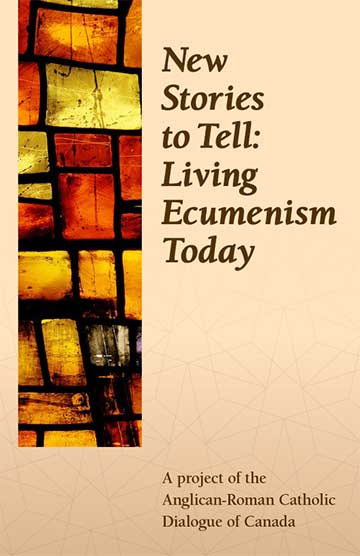In over fifty years of formal ecumenical dialogue, Anglicans and Roman Catholics have come a long way in terms of the agreement in faith that exists between our two churches. And yet, at the grassroots, often these breakthroughs are not that widely known. The official reports and agreed statements sometimes end up simply gathering dust on library shelves. We think that should change. And we believe that part of that change can come by telling some new stories. These are true stories of Anglican and Roman Catholic connections and partnerships in the real world, made possible by what the ecumenical movement has achieved. It brings texts to life in the lives of real people and places. We hope you enjoy them, and that hearing these stories may inspire you to create your own new stories where you live as well.
Preface and Introduction

All over Canada and around the world, Roman Catholics and Anglicans live in relationship with one another. We are churches together in society, neighbours in community, and in many cases members of one household. For nearly fifty years, we have had opportunities to talk about that relationship in formal dialogue. Our official conversations have produced many agreed statements and joint documents, and have also led us to deeper understanding, opening up new opportunities to live and work together.
Chapter I — Finding Family: Learning Christ Together again
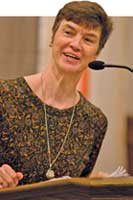
Margaret O’Gara was a Roman Catholic theologian, ecumenist, and Catholic representative on many formal ecumenical dialogues, including ARC Canada. She often spoke and wrote of the ecumenical movement as an experience of rediscovery, and she delighted in recounting instances of long-divided Christians encountering one another in new ways. The ecumenical journey is full of surprises, as we see in this, one of Dr. O’Gara’s favourite stories.
Chapter II — A continual prayer: interchurch families
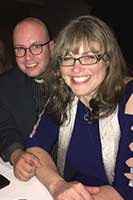
Kevin and Catherinanne met in the early 1990s at a talk about interchurch marriage held at St. Peter’s Roman Catholic Seminary in London, Ontario. Kevin is an Anglican parish priest serving a busy, vibrant congregation. Catherinanne is the Director of Campus Ministry at a Roman Catholic College, and a member of the Canadian Armed Forces Navy Reserve. Their courtship and eventual marriage raised concern and opposition from church leaders at the time, including the fear that Kevin would ‘ruin his career’ by marrying Catherinanne, and that she would need to be careful not to ‘lose her faith.’ Now married for over twenty years, Kevin and Catherinanne share their experience of the unique ecumenical vocation that is interchurch marriage.
Chapitre III — « En famille » : l’hospitalité œcuménique
Chapter III — “En Famille”: Ecumenical hospitality
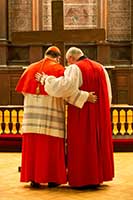
Le récit attachant que nous livre l’évêque anglican du diocèse de Québec Bruce Myers illustre un état d’esprit et un comportement qu’on n’hésitera pas à qualifier d’« hospitalité œcuménique ».
The Anglican Bishop of the Diocese of Quebec, Bruce Myers, shares with us this moving narrative of what can be well described as “ecumenical hospitality”.
Chapitre IV — L’œcuménisme au petit déjeuner : de l’amitié à l’action
Chapter IV — Breakfast table ecumenism: From friendship to action
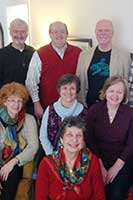
Depuis 2003, le Club des petits déjeuners théologiques réunit chaque mois à Montréal entre 12 et 15 chrétiens engagés. L’esprit œcuménique a inspiré le groupe dès le départ. Les membres fondateurs venaient soit du département d’études théologiques de l’Université Concordia (largement chrétien et comprenant des professeurs et des étudiants de diverses confessions chrétiennes) soit du Centre de spiritualité ignacienne (de tradition jésuite, mais accueillant des chrétiennes et des chrétiens de toutes les dénominations). Un samedi par mois, à tour de rôle, les membres organisent un petit déjeuner et animent la discussion d’un article ou d’un chapitre de livre sur un sujet théologique ou spirituel dont ils ont convenu. Cathie Macaulay, fondatrice du groupe, en explique la genèse.
Meeting monthly in Montreal since 2003, the Theology Breakfast Club (TBC) now gathers around 12-15 committed Christian members each month. An ecumenical spirit has been at the heart of the group since its inception. Its initial members were drawn from either Concordia University’s Department of Theological Studies (broadly Christian, including faculty and students of various Christian confessions) or the Ignatian Centre of Spirituality (in the Jesuit tradition, but welcoming Christians of any denomination). Members take turns hosting a Saturday morning breakfast, and leading the discussion of an article or book chapter on a pre- agreed theological or spiritual topic. Group founder Cathie Macaulay tells unfolds the genesis of the TBC.
Chapter V — Neighbours in faith: Welcoming the stranger
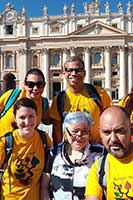
For this story we turn to the Rev. Canon Philip Hobson, OGS, Rector of the Anglican parish of St. Martin-in-the-Fields, Diocese of Toronto.
Chapter VI — Homeless and poor: Faith in action
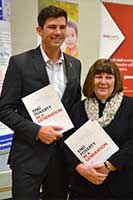
In the two stories that follow below we see examples of faith in action and action in faith, both in the context of Christians coming together to serve the common good.
Chapitre VII — Être église ensemble : sur la route de l’unité
Chapter VII — Being church together: On the way to unity
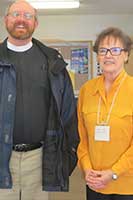
Le Révérend Stephen London, prêtre anglican, travaille à la paroisse Saint-Thomas de Sherwood Park (Alberta), une des paroisses fondatrices de la Mission œcuménique du comté de Strathcona. Le projet a maintenant 28 ans, comme l’explique Stephen.
The Rev. Stephen London is an Anglican priest at St. Thomas parish in Sherwood Park Alberta, one of the founding churches involved in the 28-years-strong Strathcona County Ecumenical Mission. Stephen tells us the story of this venerable initiative.
Chapter VIII — Signing on to unity: Creating and living into a covenant
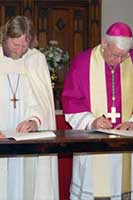
Chapitre IX — De nouveau ensemble : l’unité dans la prière
Chapter IX — Together once more: Unity in prayer
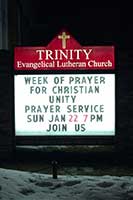
Monseigneur Gilles Ouellet, anciennement évêque de Rimouski, aimait rappeler qu’il avait grandi dans les Cantons de l’Est; avec son père, maire de la petite ville où ils habitaient, il était allé aux funérailles d’un protestant en vue dans la région. Ils allaient entrer à l’église quand le père de Gilles se tourna vers lui: « on fait ça parce que c’est ce qu’il faut faire, mais n’oublie pas: on ne prie pas dans cette égliselà ». Bien des choses ont changé au cours des cinquante dernières années. On trouve nombre d’exemples de prière en commun entre anglicans et catholiques d’un bout à l’autre du Canada. Les vignettes que voici en offrent un petit échantillon.
Archbishop Gilles Ouellet, formerly the bishop of Rimouski, often spoke of a time growing up in the Eastern Townships of Quebec where he and his father, mayor of the town in which they lived, were attending the funeral of a prominent local Protestant. As they approached the church door, Gilles recalls his father turning to him and saying: “we are doing this because it’s the right thing to do but remember, we don’t pray in this church.” A lot has changed over the last fifty years. There are many instances of Anglican-Roman Catholic common prayer all across this country, with these vignettes being a small sampling.
Chapter X — Hearing the same call: A shared charism
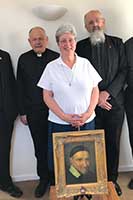
From October 12-15, 2017, the city of Rome was awash in a sea of yellow scarves as over 10,000 members of the Vincentian Family from 99 countries around the world gathered for a symposium marking the 400th anniversary of the charism of St. Vincent de Paul (1581-1660). Collaboration was a key point in the conversations and it was of particular interest to note the number of participants from various Christian as well as other faith traditions who identified themselves as Vincentians. This story drawn from the Anglican Company of Mission Priests makes this point.
Chapter XI — Gifts to be given: Mary?
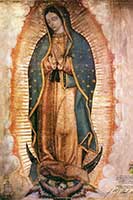
In recent years there have been important breakthroughs towards understanding between Anglicans and Roman Catholics on Marian theology and devotion. This is also a subject that continues to present enduring challenges. The two stories below give a sense of each of these realities.
The first is recounted by Professor Joe Mangina of Wycliffe College, an Anglican seminary in the evangelical Anglican tradition.
Chapter XII — Bridges not walls: Transformed through dialogue

Ecumenical dialogue happens in many different ways and at many different levels. The Co-Chairs of ARC Canada at the time of this current project have both had the honour of serving on international Commissions and Anglican and Roman Catholic dialogue as well. Bishop Linda Nicholls is a member of ARCIC III and part of the drafting team which produced the most recent text Walking Together on the Way (2018). Archbishop Donald Bolen has been the Co-Chair of International Anglican-Roman Catholic Commission for Unity and Mission (IARCCUM) since 2013. In both cases, their global ecumenical experience has had a profound influence on their local ministries.
Chapter XIII — Difficult conversations: Ecumenical communication
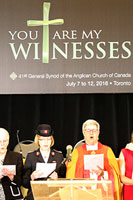
In 2013, the General Synod of the Anglican Church of Canada (ACC) proposed an amendment to its canon on marriage which would change the definition of marriage to include couples of the same sex. A process of broad consultation, including counsel from ecumenical partners, was mandated, and ARC Canada was specifically invited to provide input on this matter. Two Roman Catholic members of the Dialogue, Fr. Raymond Lafontaine and Mr. Julien Hammond, share their reflections on being asked to play this role for the ACC.
Chapter XIV — Widening the conversation: Multilateral dialogue
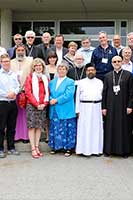
Chapter XV — Signs of unity: Sharing in “episcope”
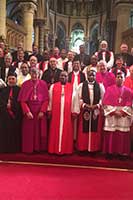
Chapter XVI — Laudato si’: A prophetic primacy
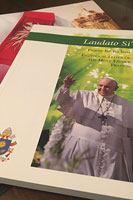
We received this story courtesy of Anupama Ranawana, a former Regional Animator for the Canadian Catholic Organization for Development and Peace.
Chapter XVII — The gospel jamboree: Singing a new song
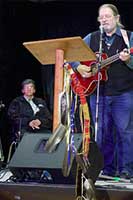
Conclusion

Our communion as Anglicans and Roman Catholics may be as yet still “imperfect” or “incomplete.” Nevertheless, new stories show that, thanks be to God, it is very much also “real.” Now is the time to make that communion more and more complete, ever more perfect, into the future. As followers of Jesus, each one of us has a vocation to be artisans of reconciliation. There are many different ways by which we can contribute to this task. We hope you will find your ways, and that as you do you will also share the story.
